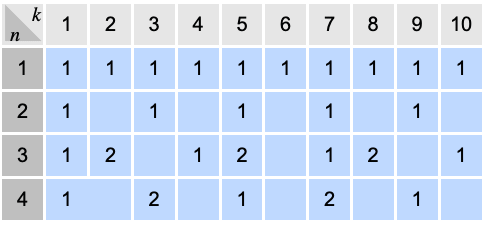MultiplicativeOrder[k,n]
gives the multiplicative order of k modulo n, defined as the smallest integer ![]() such that
such that ![]() .
.
MultiplicativeOrder[k,n,{r1,r2,…}]
gives the generalized multiplicative order of k modulo n, defined as the smallest integer ![]() such that
such that ![]() for some
for some ![]() .
.


MultiplicativeOrder
MultiplicativeOrder[k,n]
gives the multiplicative order of k modulo n, defined as the smallest integer ![]() such that
such that ![]() .
.
MultiplicativeOrder[k,n,{r1,r2,…}]
gives the generalized multiplicative order of k modulo n, defined as the smallest integer ![]() such that
such that ![]() for some
for some ![]() .
.
Details

- MultiplicativeOrder is also known as modulo order or haupt‐exponent.
- Integer mathematical function, suitable for both symbolic and numerical manipulation.
- Typically used in modular arithmetic and cryptography.
- MultiplicativeOrder[k,n] gives the smallest positive integer m such that the remainder when dividing km by n is equal to 1.
- MultiplicativeOrder returns unevaluated if there is no integer
 satisfying the necessary conditions.
satisfying the necessary conditions. - For a FiniteFieldElement object a, MultiplicativeOrder[a] gives the multiplicative order of a, defined as the smallest positive integer m such that
 is the multiplicative identity of the finite field.
is the multiplicative identity of the finite field.

Examples
open all close allBasic Examples (2)
Scope (7)
Numerical Evaluation (5)
Generalized multiplicative order:
Multiplicative order of finite field elements:
TraditionalForm formatting:
Symbolic Manipulation (2)
Applications (9)
Basic Applications (5)
Find all primitive roots modulo 43:
A rational number ![]() has a digit cycle of length
has a digit cycle of length ![]() if
if ![]() is prime and 10 is a primitive root for
is prime and 10 is a primitive root for ![]() :
:
Compute MultiplicativeOrder using NestWhileList:
Count number of possible multiplicative orders modulo a given prime number:
Number Theory (4)
The repetition period in Rule ![]() for odd
for odd ![]() divides q[n]:
divides q[n]:
The digits of ![]() in base
in base ![]() repeat with period
repeat with period ![]() :
:
The function digitCycleLength gives the digit period for any rational number ![]() in base
in base ![]() :
:
This shows that the decimal representation of ![]() in base 10 repeats every 3 digits:
in base 10 repeats every 3 digits:
Build an RSA-like toy encryption scheme:
Perform a cycling attack. One of the outputs will be the plaintext:
Properties & Relations (5)
The multiplicative order of a primitive root modulo n is EulerPhi[n]:
EulerPhi divides MultiplicativeOrder:
The result is always positive:
Find the smallest integer such that ![]() ≡ 2, 3, or 4 mod 7:
≡ 2, 3, or 4 mod 7:
Possible Issues (1)
For nonzero integers k and n, MultiplicativeOrder[k,n] exists if and only if k and n are coprime:
Interactive Examples (1)
MultiplicativeOrder of each integer below a given prime number:
Neat Examples (2)
Tech Notes
Related Guides
Related Links
History
Introduced in 1999 (4.0) | Updated in 2023 (13.3)
Text
Wolfram Research (1999), MultiplicativeOrder, Wolfram Language function, https://reference.wolfram.com/language/ref/MultiplicativeOrder.html (updated 2023).
CMS
Wolfram Language. 1999. "MultiplicativeOrder." Wolfram Language & System Documentation Center. Wolfram Research. Last Modified 2023. https://reference.wolfram.com/language/ref/MultiplicativeOrder.html.
APA
Wolfram Language. (1999). MultiplicativeOrder. Wolfram Language & System Documentation Center. Retrieved from https://reference.wolfram.com/language/ref/MultiplicativeOrder.html
BibTeX
@misc{reference.wolfram_2025_multiplicativeorder, author="Wolfram Research", title="{MultiplicativeOrder}", year="2023", howpublished="\url{https://reference.wolfram.com/language/ref/MultiplicativeOrder.html}", note=[Accessed: 27-January-2026]}
BibLaTeX
@online{reference.wolfram_2025_multiplicativeorder, organization={Wolfram Research}, title={MultiplicativeOrder}, year={2023}, url={https://reference.wolfram.com/language/ref/MultiplicativeOrder.html}, note=[Accessed: 27-January-2026]}